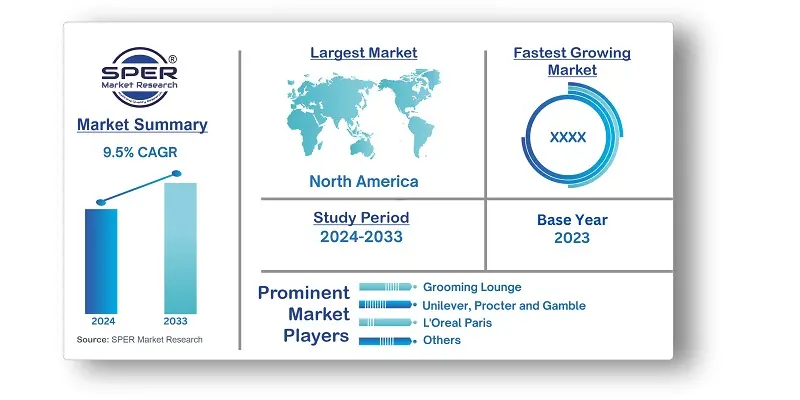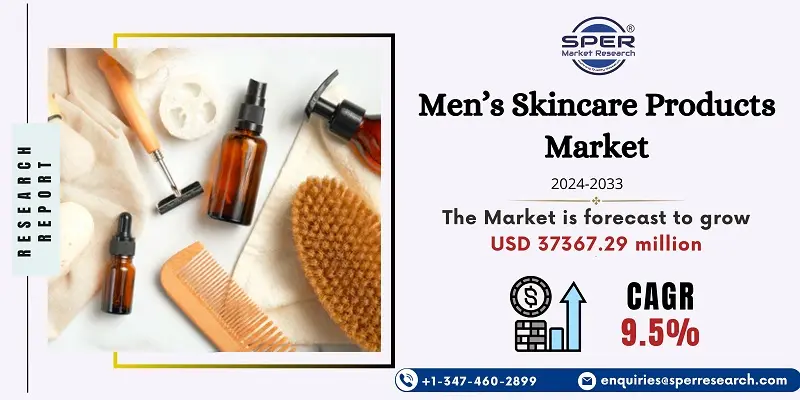
Men's Skincare Products Market Growth, Size, Trends, Demand, Revenue, Share and Future Outlook
Men’s Skincare Products Market Size- By Product, By Distribution Channel- Regional Outlook, Competitive Strategies and Segment Forecast to 2033
| Published: Feb-2024 | Report ID: FMCG2457 | Pages: 1 - 235 | Formats*: |
| Category : Consumer & Retail | |||
- In March 2022, L'Oréal revealed a new and intriguing project in partnership with Geno, a cutting-edge biotech company, demonstrating their dedication to paving the way for environmentally aware beauty. L'Oréal, in collaboration with Unilever and Kao, takes the lead in initiating this project, able to integrate sustainable stories into the composition of beauty product formulas.


| Report Metric | Details |
| Market size available for years | 2020-2033 |
| Base year considered | 2023 |
| Forecast period | 2024-2033 |
| Segments covered | By Product, By Distribution Channel |
| Regions covered | North America, Asia-Pacific, Latin America, Middle East & Africa and Europe |
| Companies Covered | Grooming Lounge, Unilever, Procter and Gamble, L'Oreal Paris, Beiersdorf AG, Koninklijke Philips N.V., Coty Inc., Edgewell Personal Care, Johnson and Johnson Services, Inc., Ester Lauder Companies, THE BODY SHOP INTERNATIONAL LIMITED, Shiseido Company Limited, Revlon, Inc., Clarins Group, and L'Occitane International SA |
- Younger Consumers
- Working Professionals
- Active Lifestyle Consumers
- Anti-Aging and Mature Skin
- Wellness and Self-Care Enthusiasts
- Digital Natives
| By Product: |
|
| By Distribution Channel: |
|
| By Region: |
|
- Global Men’s Skincare Products Market Size (FY’2024-FY’2033)
- Overview of Global Men’s Skincare Products Market
- Segmentation of Global Men’s Skincare Products Market By Product (Cleansers and Face Wash, Creams and Moisturizers, Shave Care Products, Sunscreen Products, Others)
- Segmentation of Global Men’s Skincare Products Market By Distribution Channel (Convenience Stores, E-Commerce, Hypermarkets, Pharmacies, Supermarkets, Others)
- Statistical Snap of Global Men’s Skincare Products Market
- Expansion Analysis of Global Men’s Skincare Products Market
- Problems and Obstacles in Global Men’s Skincare Products Market
- Competitive Landscape in the Global Men’s Skincare Products Market
- Impact of COVID-19 and Demonetization on Global Men’s Skincare Products Market
- Details on Current Investment in Global Men’s Skincare Products Market
- Competitive Analysis of Global Men’s Skincare Products Market
- Prominent Players in the Global Men’s Skincare Products Market
- SWOT Analysis of Global Men’s Skincare Products Market
- Global Men’s Skincare Products Market Future Outlook and Projections (FY’2024-FY’2033)
- Recommendations from Analyst
1.1. Scope of the report1.2. Market segment analysis
2.1. Research data source2.1.1. Secondary Data2.1.2. Primary Data2.1.3. SPER’s internal database2.1.4. Premium insight from KOL’s2.2. Market size estimation2.2.1. Top-down and Bottom-up approach2.3. Data triangulation
4.1. Driver, Restraint, Opportunity and Challenges analysis4.1.1. Drivers4.1.2. Restraints4.1.3. Opportunities4.1.4. Challenges4.2. COVID-19 Impacts of the Global Men’s Skincare Products Market
5.1. SWOT Analysis5.1.1. Strengths5.1.2. Weaknesses5.1.3. Opportunities5.1.4. Threats5.2. PESTEL Analysis5.2.1. Political Landscape5.2.2. Economic Landscape5.2.3. Social Landscape5.2.4. Technological Landscape5.2.5. Environmental Landscape5.2.6. Legal Landscape5.3. PORTER’s Five Forces5.3.1. Bargaining power of suppliers5.3.2. Bargaining power of buyers5.3.3. Threat of Substitute5.3.4. Threat of new entrant5.3.5. Competitive rivalry5.4. Heat Map Analysis
6.1. Global Men’s Skincare Products Market Manufacturing Base Distribution, Sales Area, Product Type6.2. Mergers & Acquisitions, Partnerships, Product Launch, and Collaboration in Global Men’s Skincare Products Market
7.1. Global Men’s Skincare Products Market Value Share and Forecast, By Product, 2024-20337.2. Cleansers and Face Wash7.3. Creams and Moisturizers7.4. Shave Care Products7.5. Sunscreen Products7.6. Others
8.1. Global Men’s Skincare Products Market Value Share and Forecast, By Distribution Channel, 2024-20338.2. Convenience Stores8.3. E-Commerce8.4. Hypermarkets8.5. Pharmacies8.6. Supermarkets8.7. Others
9.1. Global Men’s Skincare Products Market Size and Market Share
10.1. Global Men’s Skincare Products Market Size and Market Share By Product (2020-2026)10.2. Global Men’s Skincare Products Market Size and Market Share By Product (2027-2033)
11.1. Global Men’s Skincare Products Market Size and Market Share By Distribution Channel (2020-2026)11.2. Global Men’s Skincare Products Market Size and Market Share By Distribution Channel (2027-2033)
12.1. Global Men’s Skincare Products Market Size and Market Share By Region (2020-2026)12.2. Global Men’s Skincare Products Market Size and Market Share By Region (2027-2033)12.3. Asia-Pacific12.3.1. Australia12.3.2. China12.3.3. India12.3.4. Japan12.3.5. South Korea12.3.6. Rest of Asia-Pacific12.4. Europe12.4.1. France12.4.2. Germany12.4.3. Italy12.4.4. Spain12.4.5. United Kingdom12.4.6. Rest of Europe12.5. Middle East and Africa12.5.1. Kingdom of Saudi Arabia12.5.2. United Arab Emirates12.5.3. Rest of Middle East & Africa12.6. North America12.6.1. Canada12.6.2. Mexico12.6.3. United States12.7. Latin America12.7.1. Argentina12.7.2. Brazil
12.7.3. Rest of Latin America
13.1. Beiersdorf AG13.1.1. Company details13.1.2. Financial outlook13.1.3. Product summary13.1.4. Recent developments13.2. Clarins Group13.2.1. Company details13.2.2. Financial outlook13.2.3. Product summary13.2.4. Recent developments13.3. Coty Inc13.3.1. Company details13.3.2. Financial outlook13.3.3. Product summary13.3.4. Recent developments13.4. Edgewell Personal Care13.4.1. Company details13.4.2. Financial outlook13.4.3. Product summary13.4.4. Recent developments13.5. Ester Lauder Companies13.5.1. Company details13.5.2. Financial outlook13.5.3. Product summary13.5.4. Recent developments13.6. Grooming Lounge13.6.1. Company details13.6.2. Financial outlook13.6.3. Product summary13.6.4. Recent developments13.7. Johnson and Johnson Services, Inc13.7.1. Company details13.7.2. Financial outlook13.7.3. Product summary13.7.4. Recent developments13.8. Koninklijke Philips N.V13.8.1. Company details13.8.2. Financial outlook13.8.3. Product summary13.8.4. Recent developments13.9. L'Occitane International SA13.9.1. Company details13.9.2. Financial outlook13.9.3. Product summary13.9.4. Recent developments13.10. L'Oreal Paris13.10.1. Company details13.10.2. Financial outlook13.10.3. Product summary13.10.4. Recent developments13.11. Procter and Gamble13.11.1. Company details13.11.2. Financial outlook13.11.3. Product summary13.11.4. Recent developments13.12. Revlon, Inc13.12.1. Company details13.12.2. Financial outlook13.12.3. Product summary13.12.4. Recent developments13.13. Shiseido Company Limited13.13.1. Company details13.13.2. Financial outlook13.13.3. Product summary13.13.4. Recent developments13.14. THE BODY SHOP INTERNATIONAL LIMITED13.14.1. Company details13.14.2. Financial outlook13.14.3. Product summary13.14.4. Recent developments13.15. Unilever13.15.1. Company details13.15.2. Financial outlook13.15.3. Product summary13.15.4. Recent developments13.16. Others
SPER Market Research’s methodology uses great emphasis on primary research to ensure that the market intelligence insights are up to date, reliable and accurate. Primary interviews are done with players involved in each phase of a supply chain to analyze the market forecasting. The secondary research method is used to help you fully understand how the future markets and the spending patterns look likes.
The report is based on in-depth qualitative and quantitative analysis of the Product Market. The quantitative analysis involves the application of various projection and sampling techniques. The qualitative analysis involves primary interviews, surveys, and vendor briefings. The data gathered as a result of these processes are validated through experts opinion. Our research methodology entails an ideal mixture of primary and secondary initiatives.



Frequently Asked Questions About This Report
PLACE AN ORDER
Year End Discount
Sample Report
Pre-Purchase Inquiry
NEED CUSTOMIZATION?
Request CustomizationCALL OR EMAIL US
100% Secure Payment






Related Reports
Our Global Clients
Our data-driven insights have influenced the strategy of 200+ reputed companies across the globe.




















